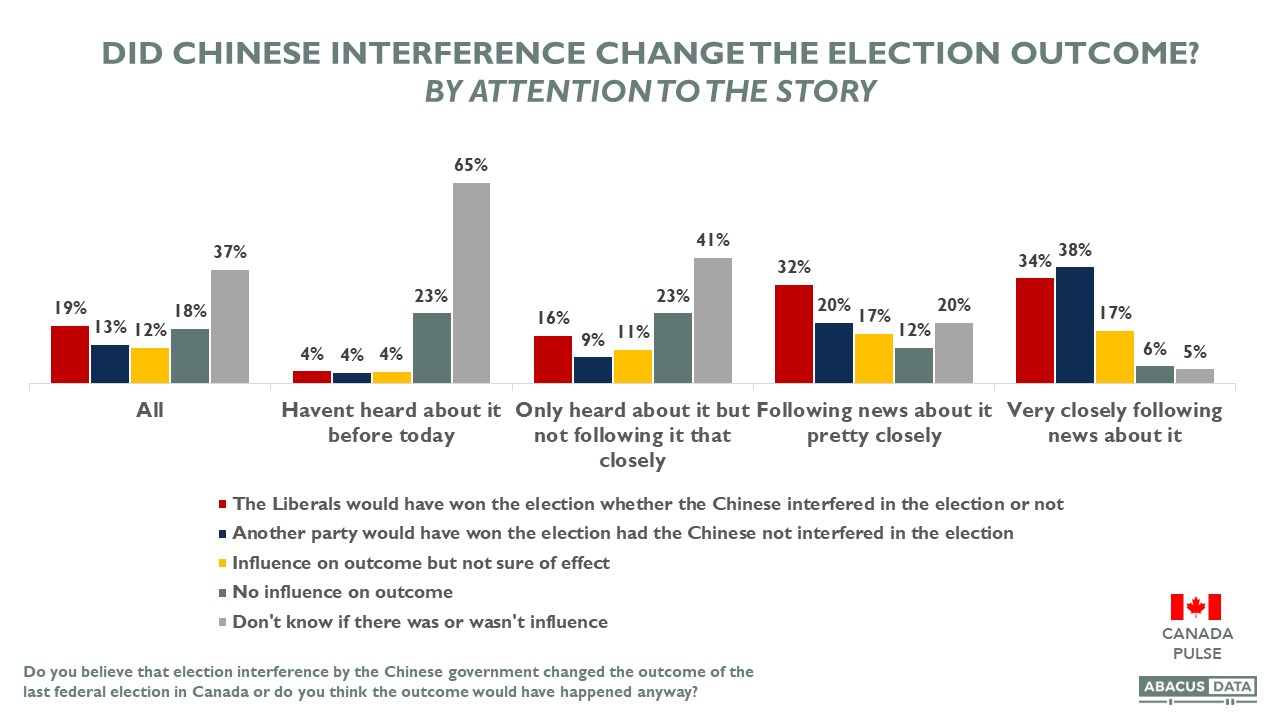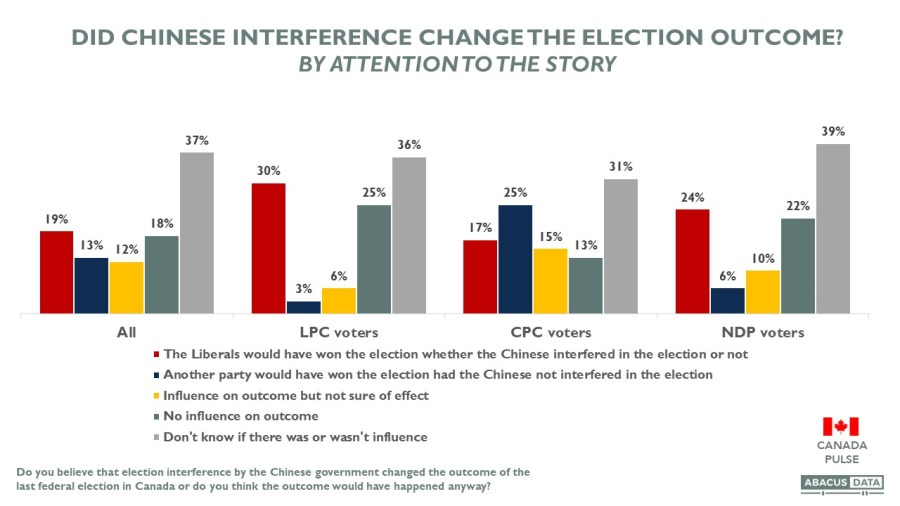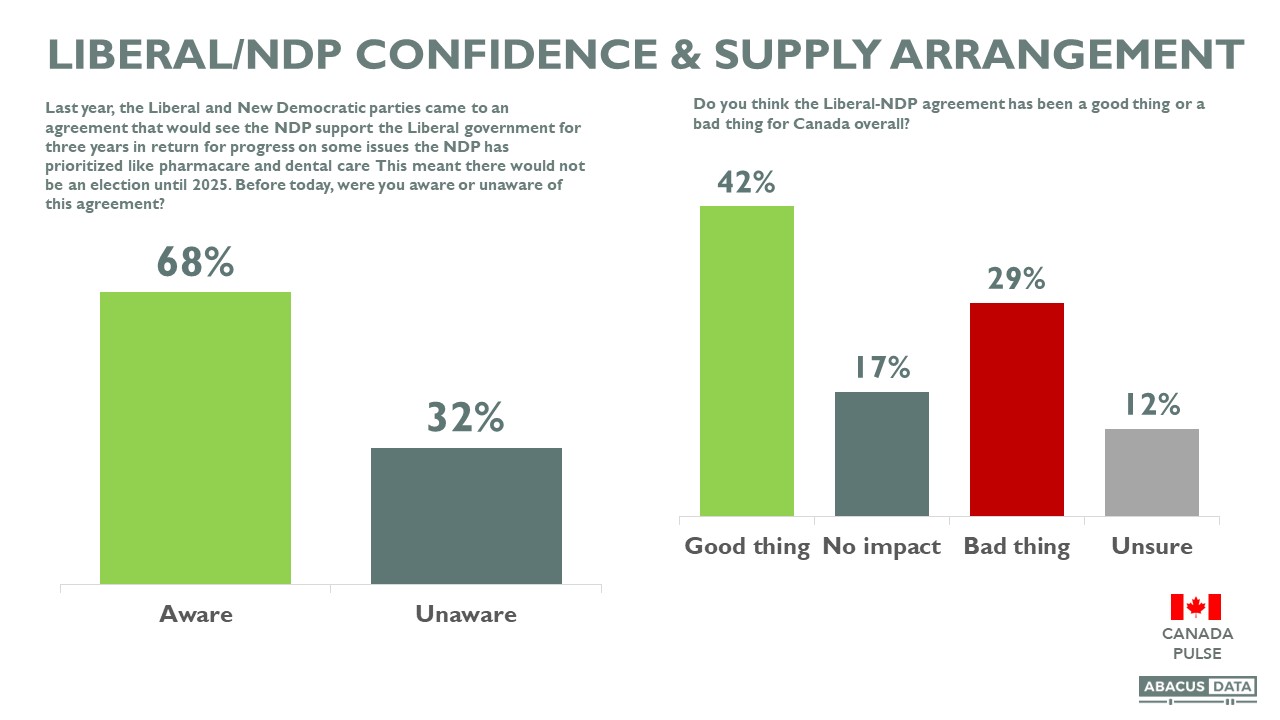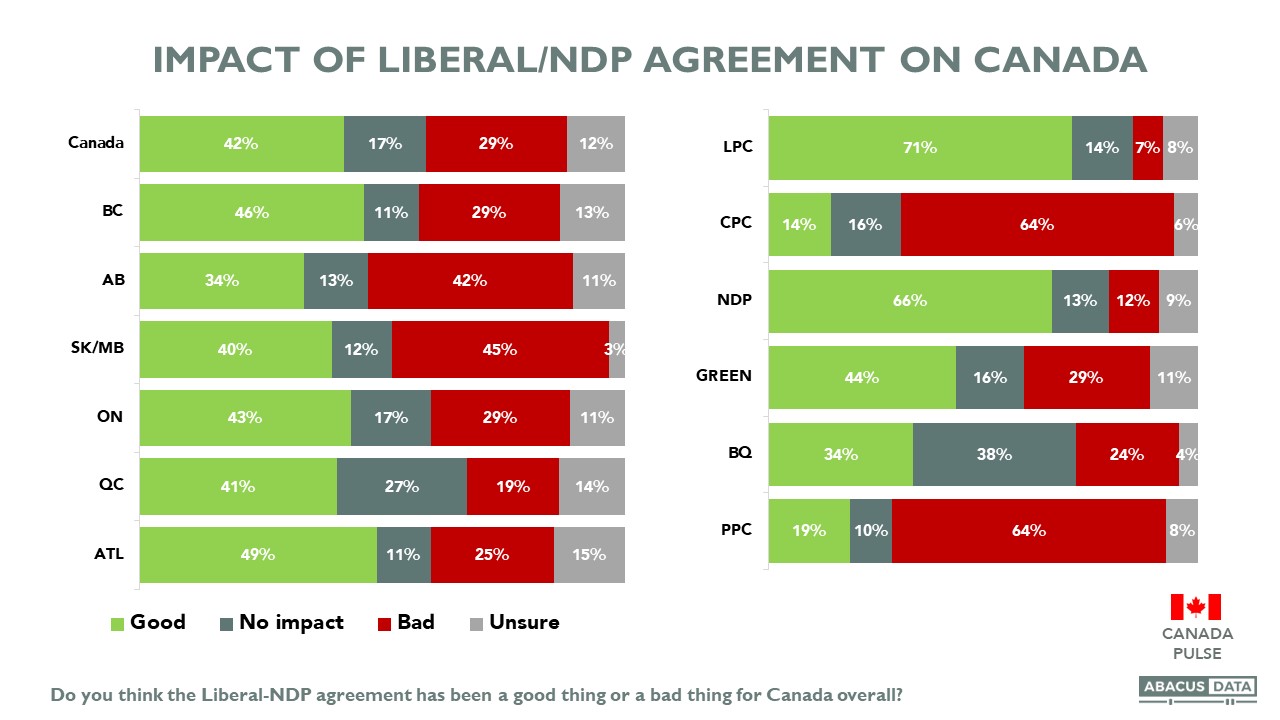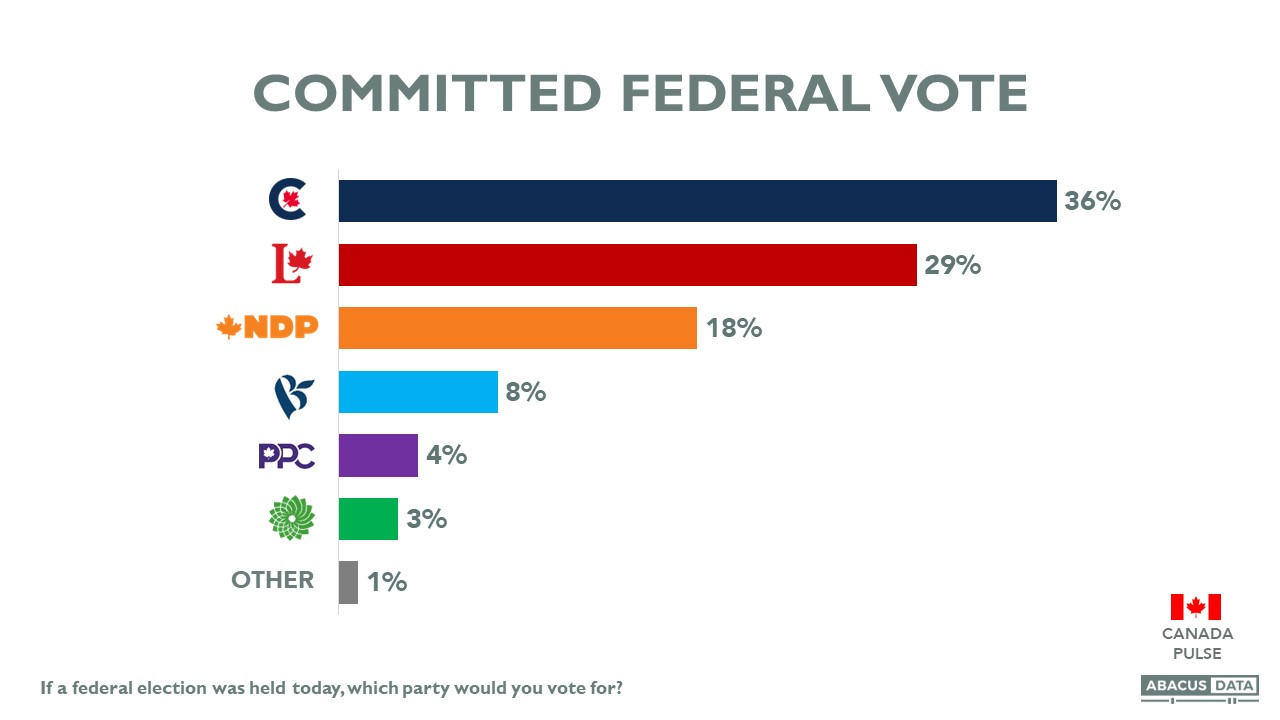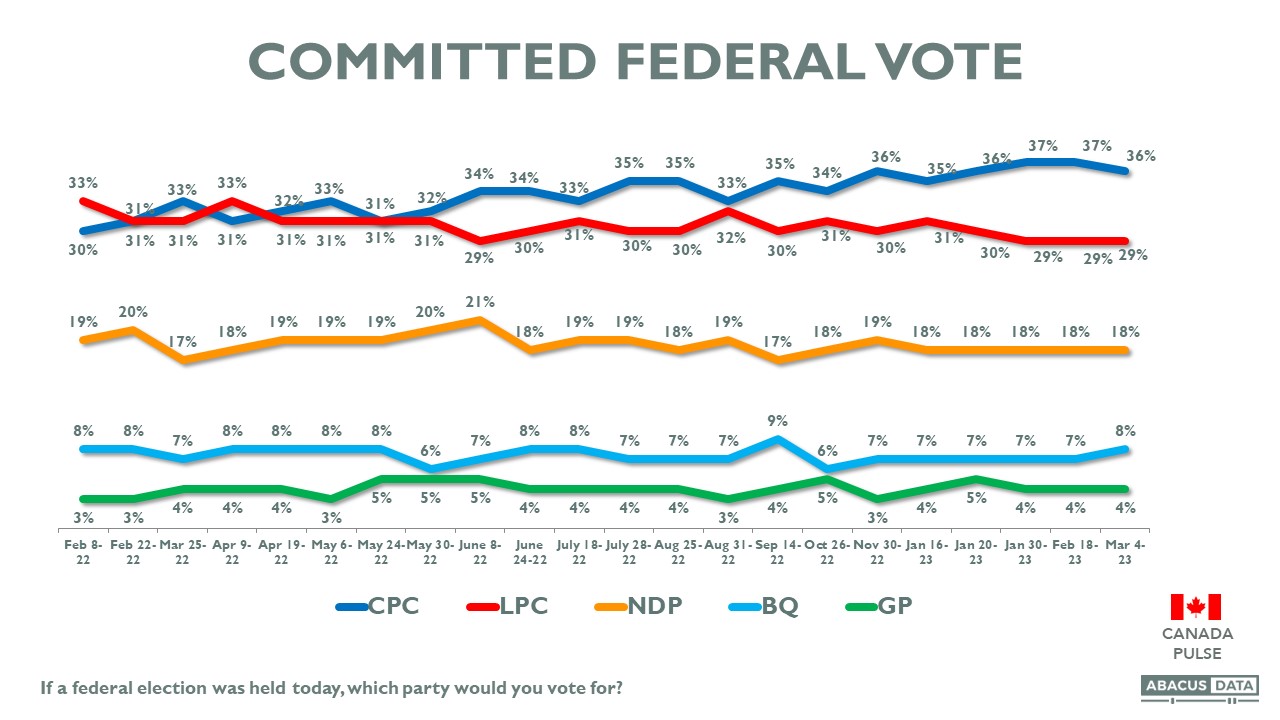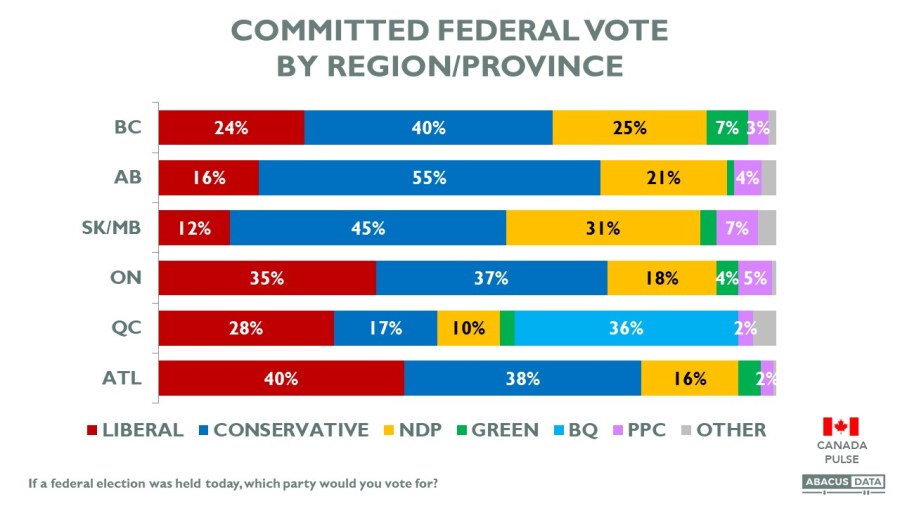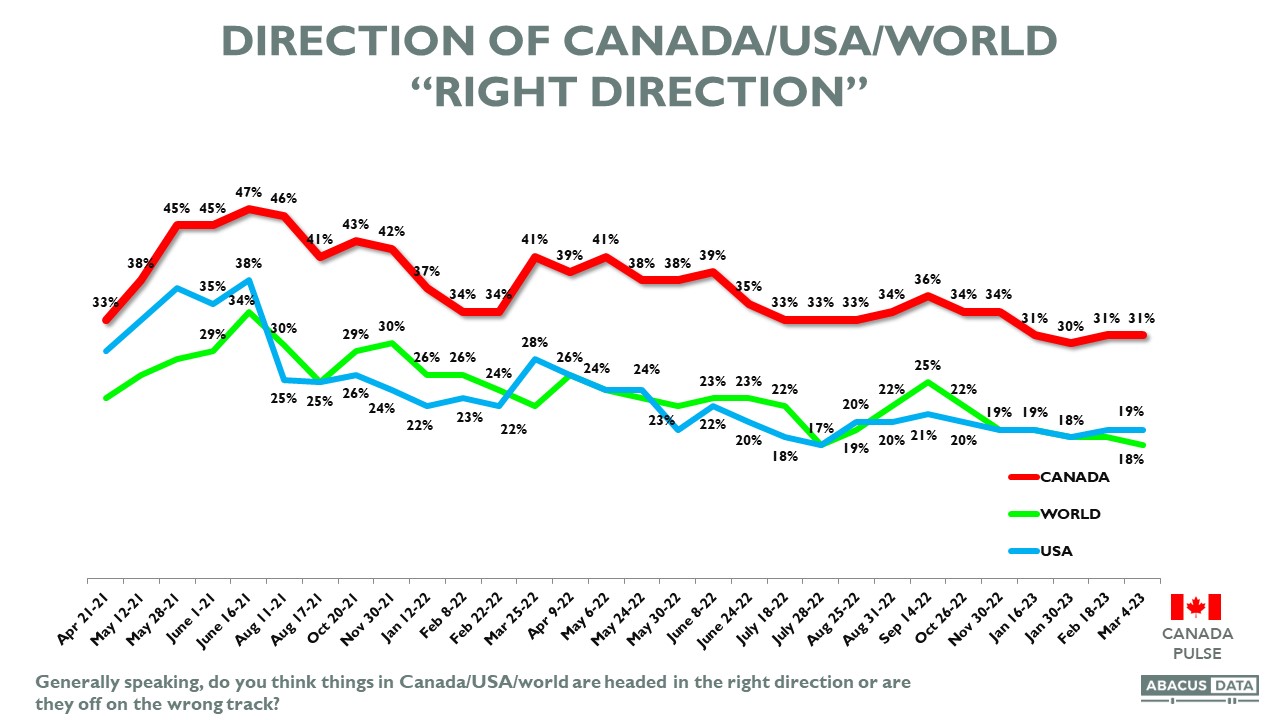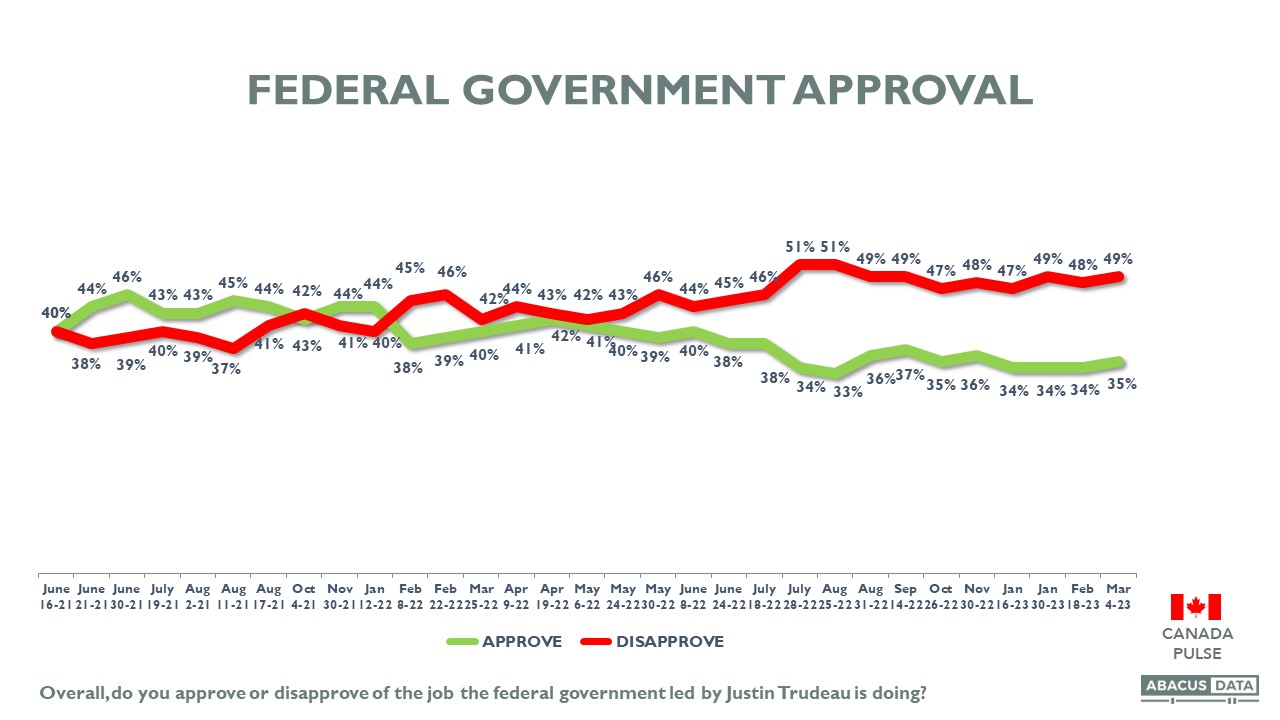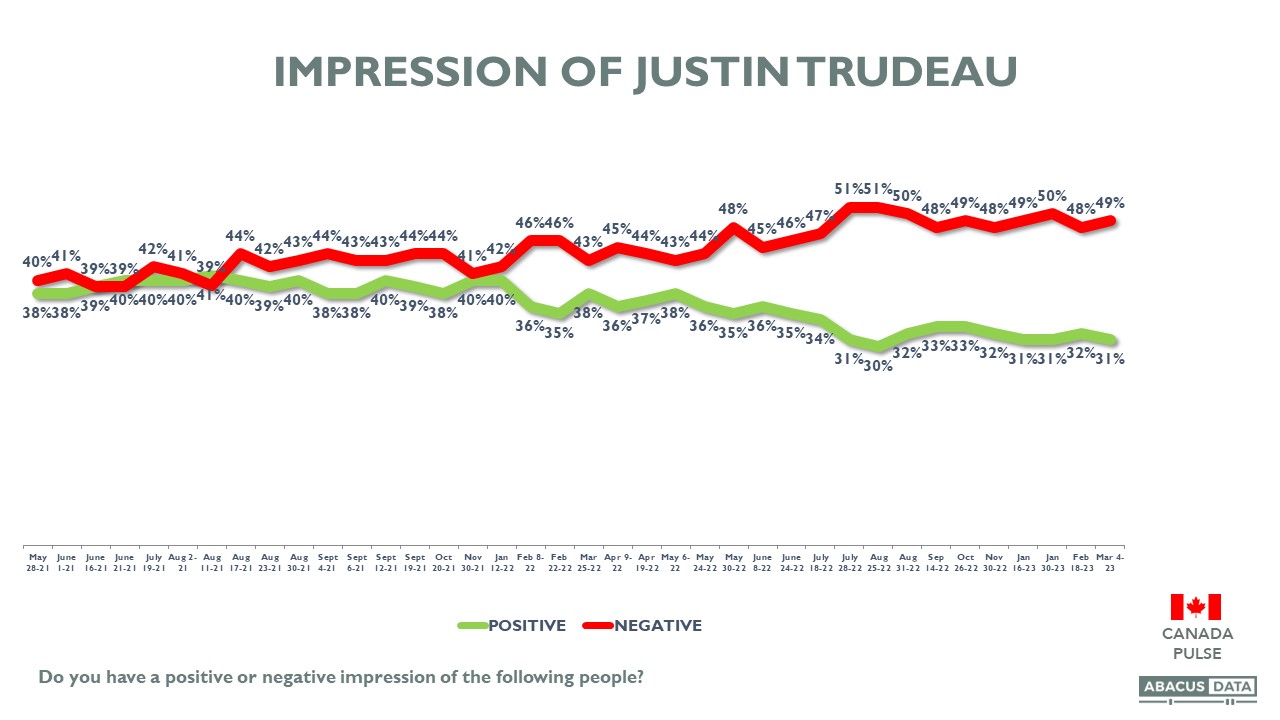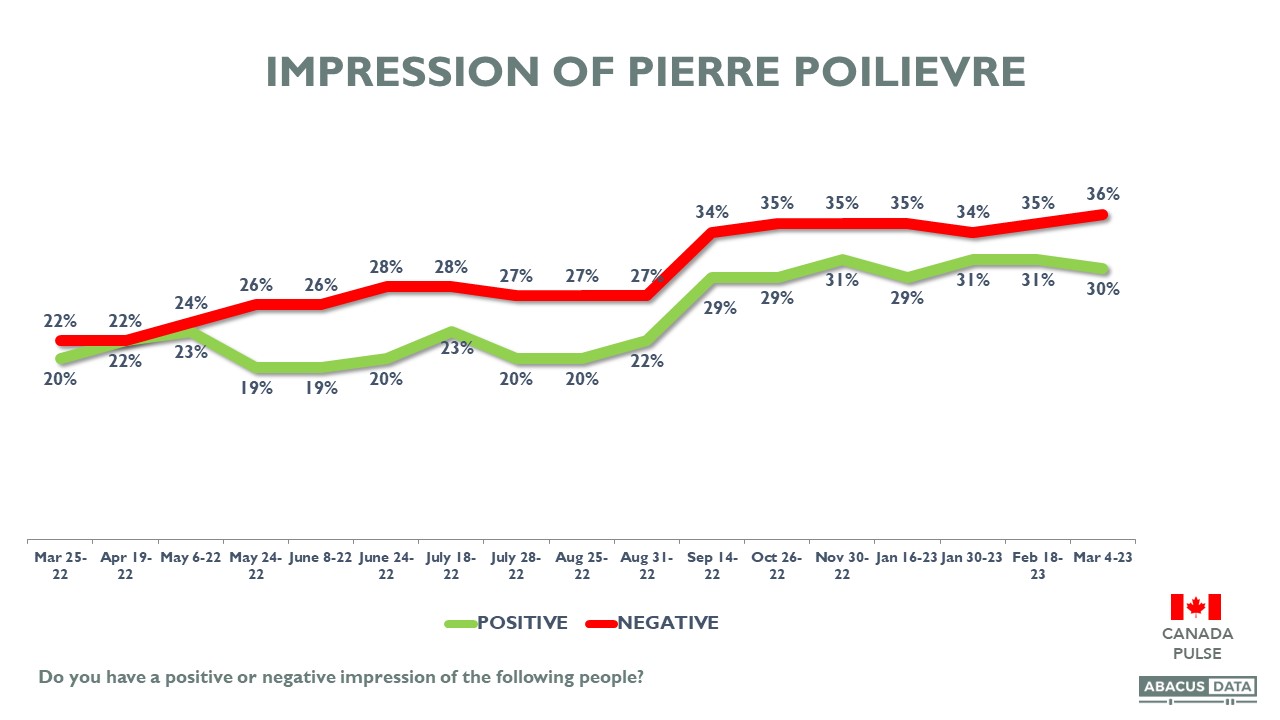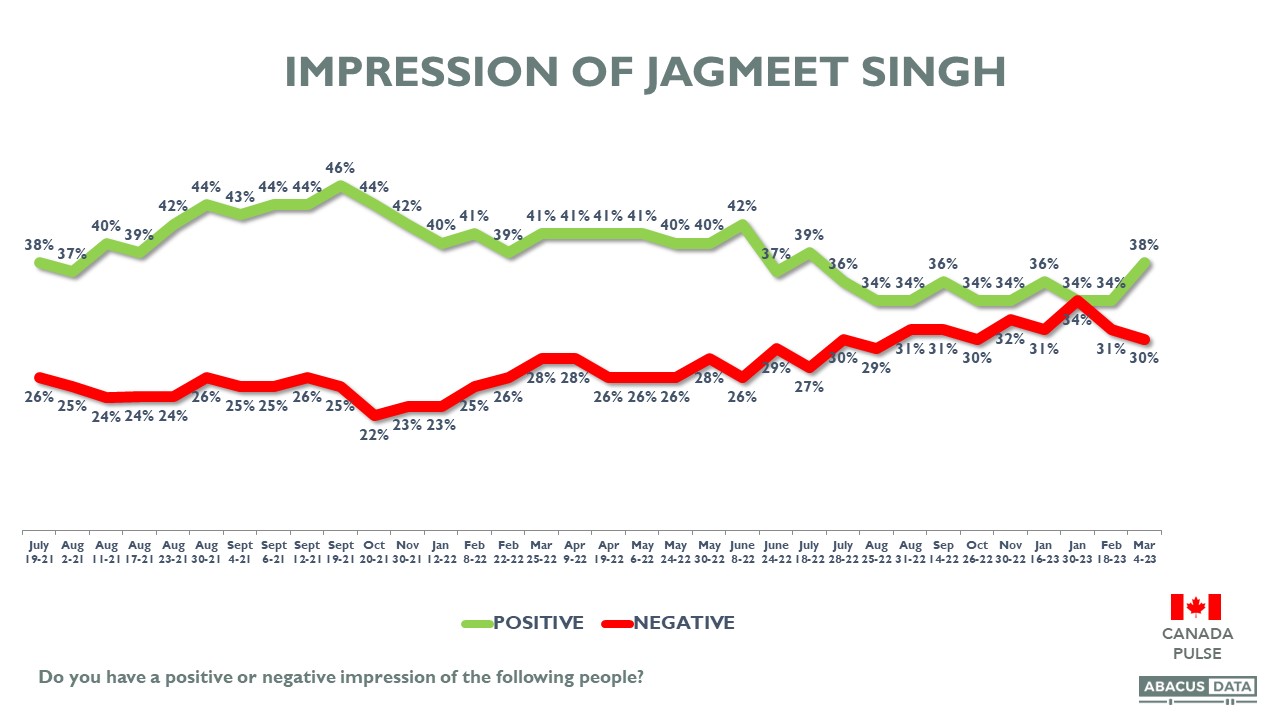A Deep Dive on Canadian Political Attitudes: Chinese election interference & the Liberal/NDP Agreement
From March 2 to 4, 2023, Abacus Data conducted a national survey of 2,600 adults exploring several topics related to Canadian politics and current events as part of our regular national omnibus surveys.
Note, this survey was completed prior to the Prime Minister’s announcement on Monday evening and comments by opposition party leaders and MPs in response.
In this report, I report on several topics:
- Views on possible Chinese interference in Canadian federal election and support for a public inquiry.
- Impression of the Liberal/NDP Confidence and Supply Agreement as it approaches its one-year anniversary.
- An update to our regular tracking of vote intentions and impressions of political leaders and other issues.
Chinese Government Interference in Canadian Elections
As of last Saturday, just over eight in ten Canadians said they had heard about the news regarding possible Chinese government interference in Canadian federal elections. Eight percent are following the story very closely while another 25% say they are following it pretty closely. Compared with other issues we have asked similar questions about, this is a higher-than-normal level of awareness, but not a high degree of engagement on the issue.
Overall, 44% of Canadians believe the Chinese government was actively trying to influence the outcome of the 2021 election. 18% don’t believe it was happening while 37% are unsure. Almost all of those following the issue closely believe the Chinese government was trying to influence the election.
In a follow-up question to those who believe the Chinese government was trying to influence the election, we asked whether that interference changed the outcome of the election or not.
When we combine responses to this question with the original question we find that:
- 37% of Canadians are unsure whether the Chinese government interfered in the 2021 federal election
- 18% of Canadians believe the Chinese government did not try to influence the 2021 federal election.
- 19% believe the Chinese government was trying to influence the outcome but that the Liberals would have won the election anyway, whether the Chinese interfered in the election or not.
- 13% believe the Chinese government was trying to influence the outcome and the election outcome was changed. Another party would have won the election had the Chinese not interfered in the election.
- 12% believe the Chinese government was trying to influence the outcome but are unsure where it changed the election outcome.
Not surprisingly, those who are following the issue more closely have more definitive views on the impact of that interference on the election outcome but even about 1 in 3 are uncertain about the impact of possible election interference.
When we look at these results through a partisan lens, we find that 1 in 4 Conservative voters in 2021 believe the Chinese government tried to influence the outcome of the 2021 election, and another party would have won had it not interfered.
Finally, we asked people if they thought the Prime Minister should call a public inquiry to investigate this issue further. Note, this was asked before the announcement on Monday.
There is widespread support for an inquiry, little opposition, and Liberal voters are as likely as Conservatives ones to support an inquiry.
Liberal-NDP Confidence and Supply Agreement
We also asked Canadians their views on the Liberal-NDP Confidence and Supply agreement as it approaches its one-year anniversary. Be sure to listen to Althia Raj’s podcast where the topic is explored in far more detail.
Today, 1 in 3 Canadians had not heard about the agreement before we asked about it in our survey.
Overall, 42% believe the agreement has been a good thing for Canada while 29% feel it has been a bad thing. 17% say it’s had no impact. These results align with Canadians’ expectations about the deal in a survey we completed a year ago.
Views about the deal are strongly correlated to party support. 71% of Liberal supporters and 66% of NDP supporters think the agreement has been a good thing for Canada. Green and BQ supporters hold more mixed views while Conservative and People’s Party supporters generally think the deal has been bad for Canada.
When asked whether the NDP should continue to support the deal it has with the Liberals and prevent an early election or whether the NDP should end the deal even if it means forcing an early election, Canadians are pretty split. 53% want the deal to continue while 47% want it to end.
Again, partisanship plays a big role in determining one’s view on the matter. 85% of Liberal supporters want the deal to continue while 81% of Conservative supporters want it to end.
Among NDP supporters, 68% want the deal to continue while 32% want it to end.
Given all the news and events in the past few weeks, has the political opinion environment in Canada changed?
The short answer is no.
If an election was held at the time of the survey, the Conservatives would get 36% of the vote with the Liberals seven points back at 29%. The NDP is in third at 18%. Compared with our last survey, there has been almost no change in vote intention.
Among all Canadians (not just those committed to voting for one party), 29% would vote Conservative, 24% Liberal, and 15% for the NDP. 18% of Canadians are undecided at this time.
Regionally, the Conservatives are well ahead in British Columbia, Alberta, Saskatchewan, and Manitoba. The Conservatives and Liberals are statistically tied in Ontario and Atlantic Canada while in Quebec, the BQ is ahead by 8 points over the Liberals.
Beyond vote intention, other indicators are also fairly steady since last month.
The overall mood of the country looks similar to what it’s been for the past five months. The mood remains quite negative with only 31% feel the country is headed in the right direction.
The federal government’s approval rating is steady as well with 35% approving and 49% disapproving representing only a marginal one-point change since last month.
Impressions of the party leaders, except for Jagmeet Singh, are steady as well.
- Justin Trudeau: 31% positive (-1) vs. 49% negative (+1) = -18 net
- Pierre Poilievre: 30% positive (-1) vs. 36% negative (+1) = -6 net
- Jagmeet Singh: 38% positive (+4) vs. 30% negative (-1) = +8 net
Even when we measure the electorate’s desire for change we don’t see much change although the desire for change remains elevated than what it was at the end of either the 2019 or 2021 election campaigns.
Today 49% definitely want to see a change in government while another 25% want change but say it’s not important to them. In contrast, 14% definitely want to see the Liberals re-elected while 12% want to keep the Liberals in power, but say it’s not that important to them.
UPSHOT
 According to David Coletto: “Although the Chinese election interference story has gained wide public awareness, not many people are closely following it. While there is more interest and engagement than usual for national political stories, the majority of Canadians have not yet become engaged in the topic.
According to David Coletto: “Although the Chinese election interference story has gained wide public awareness, not many people are closely following it. While there is more interest and engagement than usual for national political stories, the majority of Canadians have not yet become engaged in the topic.
Furthermore, the story has left many Canadians feeling confused and uncertain about the situation, which is not surprising given that much of the information available is based on leaked intelligence reports and incomplete accounts of what is known. Despite this, there is strong public support for a public inquiry, which may put additional pressure on the federal government and the Prime Minister to expand the investigations they have already initiated.
However, so far, these events have not had any significant impact on public opinion about politics or political choices. There has been no shift in vote intentions, impressions of the party leaders, or the general desire for change. This may change if more news comes to light, but currently, it seems that while the public is concerned about possible interference in elections, it has not altered their views of the political options available. The Conservative Party continues to have an advantage, while the Liberal Party continues to face its most challenging opinion environment since being elected in 2015.”
METHODOLOGY
The survey was conducted with 2,600 Canadian adults from March 2 to 4, 2023. A random sample of panelists were invited to complete the survey from a set of partner panels based on the Lucid exchange platform. These partners are typically double opt-in survey panels, blended to manage out potential skews in the data from a single source.
The margin of error for a comparable probability-based random sample of the same size is +/- 2.0%, 19 times out of 20.
The data were weighted according to census data to ensure that the sample matched Canada’s population according to age, gender, educational attainment, and region. Totals may not add up to 100 due to rounding.
This survey was paid for by Abacus Data Inc.
Abacus Data follows the CRIC Public Opinion Research Standards and Disclosure Requirements that can be found here: https://canadianresearchinsightscouncil.ca/standards/
ABOUT ABACUS DATA
We are the only research and strategy firm that helps organizations respond to the disruptive risks and opportunities in a world where demographics and technology are changing more quickly than ever.
We are an innovative, fast-growing public opinion and marketing research consultancy. We use the latest technology, sound science, and deep experience to generate top-flight research-based advice to our clients. We offer global research capacity with a strong focus on customer service, attention to detail, and exceptional value.
We were one of the most accurate pollsters conducting research during the 2021 Canadian election following up on our outstanding record in 2019.
Contact us with any questions.
Find out more about how we can help your organization by downloading our corporate profile and service offering.


